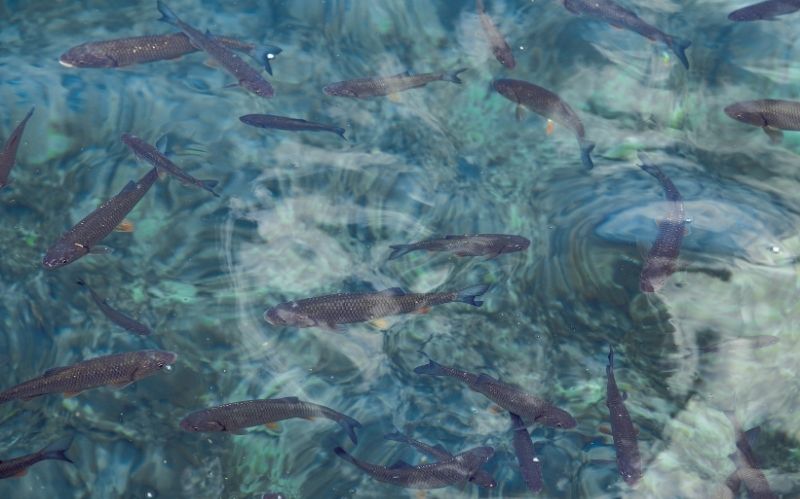No products in the cart.
7 Tips to Keep Pond Water Clean

The value of good quality water in a pond habitat is known to most water gardeners. It is a huge, dirty job to clean your pond water, and it is particularly laborious and tedious when you have fish in your pond. Understanding how to get or maintain water quality can often prove difficult
Your pond might have clear water but your fish might be behaving differently. This may mean that in the water of your pond something maybe a little off. You will be better able to overcome any pond water problems you may have with some knowledge and experience.
Here are the most common solutions to help keep your pond water clean.
Don’t Overfeed Your Fish
You shouldn’t feed your fish more than once a day. The surplus food is left to fall into the bottom of the pond when you feed fish more than they need to consume. Feed them what they can eat for at most about 4 minutes. Choose a high-quality fish food: ones that float if left uneaten are better as opposed to sinking to the bottom of the pond.
Check when your fishes are done feeding if there is food leftover in the pond. Reduce the amount of food the next time you are feeding them. It will make an enormous difference.
Don’t Have Too Many Fish

Having more than 8”-10” of fish for every 100 gallons of water, your pond is likely over-populated. Your pond will probably have a hard time keeping up with the fish waste load. Excessive fish waste will cause an imbalance in the pond water. Find some of them a new home.
Have Enough Plants in Your Pond

You should have 40% to 60% of the surface area of your pond either covered or shaded by plants. Because of the photosynthetic process, too many plants can cause oxygen deficiencies at night. It’s when plants take in oxygen and give off carbon dioxide. Your fish need oxygen to survive.
Have Enough Circulation
At a minimum, you should circulate the entire water volume of the pond at least once per hour. Ensure that the flow of your pump is not limited by debris in the skimmer or biological filter. Take care not to pump water higher than it was intended. Every pump has its limitations on flow.
Maintaining the pump will ensure that something stuck to the intake does not limit the flow.
Clean Any Leaves or Debris from the Pond
Much of the debris can be cleared from the surface of your pond by your pond skimmer. But you can also use a pond net to skim leaves and tiny sticks. Make sure to do it before they have a chance to descend to the pond’s bottom where they’ll decay.
The decaying debris, combined with fish waste and leftover fish food, can cause ammonia levels to spike in your pond. Ammonia can be detrimental to your fish and should be promptly addressed. After adding an algae treatment to your pond, fish will start jumping out of the water. This shows that you probably have an ammonia spike.
You can get an ammonia test kit from your local pet and aquarium store. Check the ammonia level of your pond water. If you find the levels are high, simply treat your pond water with Ammonia Neutralizer.
Beneficial microbes such as Aquascape Beneficial Bacteria help the finned friends keep their pond water safe and clean. An Automatic Dosing System will electronically dispense beneficial bacteria and other treatments to your pond. This will help with breaking down debris and maintaining a proper nitrogen cycle.
Filter Your Pond
Just like your pond pump, the filter of your pond should match your water garden’s scale. Most pond filters are based on ideal conditions, and your filter becomes less efficient if you surpass those. Often up-size the filter so that it can accommodate more than the pond’s capacity and remember to clean the filter as directed.
Filter mats and foams are built to prevent ponds from clogging and improve the growth of bacteria. While there are multiple products out there, it is advisable that you pick on the best filter mat manufacturers to get the best quality mats for your pond. It’s essential to have a good quality filter so that your fish can live healthily and comfortably. Check imountaintree.com for more information.
An Aquascape habitat pond has two types of filters. A mechanical filter, also known as a skimmer. It helps remove surface debris, such as leaves and small sticks, from the pond water. The other filter is positioned to establish the beginning of the waterfall in your pond. It’s known as the biological filter, or BioFalls filter.
This filter uses bacteria to break down pond wastes, converting them into less harmful compounds. They are then utilized as fertilizer by your aquatic plants, which helps create a beneficial cycle in your pond.
Have a Pond Vacuum
Pond vacuums are available in a variety of sizes and shapes. You can get one that comes with multiple accessories. These accessories will help you reach the places in your pond that are the hardest to reach. With this specifically designed vacuum, it’s possible to clean the bottom of your pond without having to drain the water.
If you have a deep pond, be prepared to spend a little more on a vacuum that has good suction. Maybe also a telescopic handle if necessary. For smaller ponds, simple models are more appropriate as they will lose suction the deeper they go.
You can hold the rest of your sludge if you have a wildlife pond. Sludge provides pond plants with nutrients and insects and microorganisms with food. If this is the case for you, it will be better not to manually drain the sludge and apply beneficial bacteria instead. Pond sludge removers have a high concentration of natural bacteria that break down lingering waste in your water.
Conclusion
You will have to clean your reservoir more often if you do not have a pond filtration system. You should perform a thorough cleaning at the end of the fall. Doing major cleaning at the end of the fall will ensure your fish have very minimal waste in their habitat. They will move into their winter hibernation without stress.
Your pond cleanliness helps in keeping your fish safe and more comfortable. It also boosts your pond’s ecosystem.










Leave a Reply